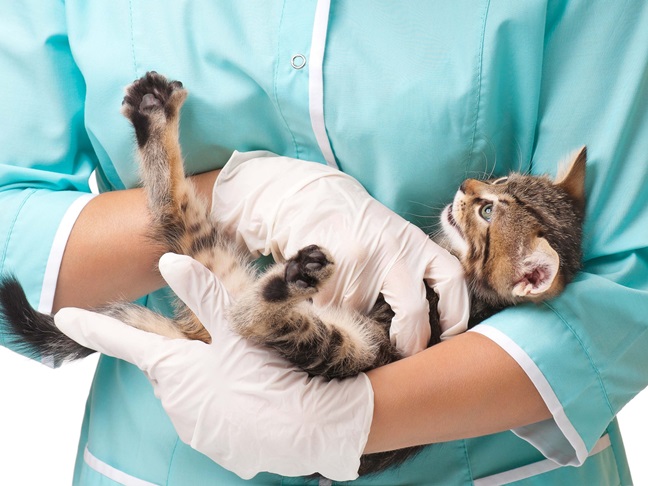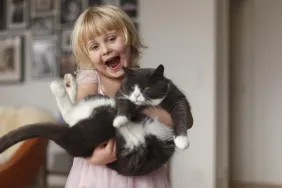It’s a fact that fewer cats get to visit the veterinarian than dogs. It’s very important to take heed of any changes you notice—no matter how small or insignificant you may think they are—and seek veterinary attention. All cats should get a wellness check at least once a year. You owe it to them as their primary caregiver and, besides, you could be saving on veterinary bills down the road.
Pay Attention to the Litter Box
When taking inventory of your cat’s health, the litter box is a very good place to start! When you scoop, take careful note of any changes to her poop or pee. Both constipation and diarrhea need to be checked out, as they could be the signs of an internal issue, which may or may not be food-related. Constipation for example, can be sign of a mega colon problem. Similarly, take note of any changes in pee in terms of quantity or smell. Increased urination could be an indication of serious diseases such as diabetes and renal failure. If your cat starts straining or crying in the litter box take heed. And if a cat suddenly avoids the litter box altogether, don’t simply write it off as naughtiness; this is a very common sign of urinary tract disease, which is easily treated.
Pay Attention to Water Consumption
Cats are naturally drawn to running water. In fact, that’s why many veterinarians recommend providing your pet with a drinking fountain to keep her better hydrated, especially if she is on a dry food diet. However, if you cat is constantly drinking, whether it’s from a bowl or fountain, and even drinking for longer spells than usual, these are signs not to be ignored. As already mentioned, any changes to her pee routine could be signs of diabetes or kidney issues, which can manifest in both young and older cats.
Pay Attention to Weight
Increased weight loss or weight gain may not be a sign that you cat loves or hates what’s in her food bowl. Consider this a major red flag. An increased appetite could again point to diabetes or hyperthyroidism, which is a glandular disorder. Increased appetite AND SIMULTANEOUS weight loss are also signs to take act upon. While eating less can also point to very common dental issues too.
Pay Attention to Breath Issues
Bad breath may indeed have nothing to do with her favorite fishy snack. It is a sign that all is not well in her mouth. Cats have tartar issue that can develop into plaque and gingivitis just like in humans. They also get holes in their teeth causing severe and very painful toothache. A dental check by a veterinarian or qualified technician (be wary of gentle dental-type techniques offered randomly) should be done annually. Also holes in your cat’s teeth may not be visible because cats suffer from FORLS (Feline Oral Resorptive Lesions) are openings or holes in the tooth, which start inside the tooth and are advanced by the time they are visible. Changes to her chewing and swallowing patterns are another clue. Bacteria left unattended in the mouth are ingested and cal lead to other serious illnesses such as heart disease.
Pay Attention to Hair
Cats are fastidious self-groomers, and, if kitty is having a bad hair day every day, take note. A change in diet can cause this, but its also a sign of allergies both food, fleas and seasonal (dust and ragweed) as well as more serious issues such as hyperthyroidism once more. Also take note if her grooming patterns change. Cats that over-groom and even pull their hair out could be suffering from a fleabite. It takes just one bite to cause a terrible reaction! However, pulling out fur is also a sign or stress and anxiety and needs proper veterinary diagnosis as such symptoms could also point to a heart condition.
Pay Attention to Energy Levels
Also take careful note of changes in her activity levels. Cats as they age suffer from circulation problems and painful arthritis. However excessive sleeping and lethargy could even point to some form of toxicity in her system. For example, cats are very sensitive to essential oils that burn constantly in many households. The feline liver does not have enzymes needs to metabolize the compounds in essential oils, leading to a toxic build-up. Also she may have eaten a poisonous houseplant such as call lilies and poinsettia that are particularly abundant around the holiday season.
Last, if your cat has always been independent and suddenly is glued to you side, take note. If she suddenly becomes very chatty even yowling, check it out.
In fact, when it doubt, do something about it! And take note of your own instincts, if you feel something is wrong, you could very well be right!








